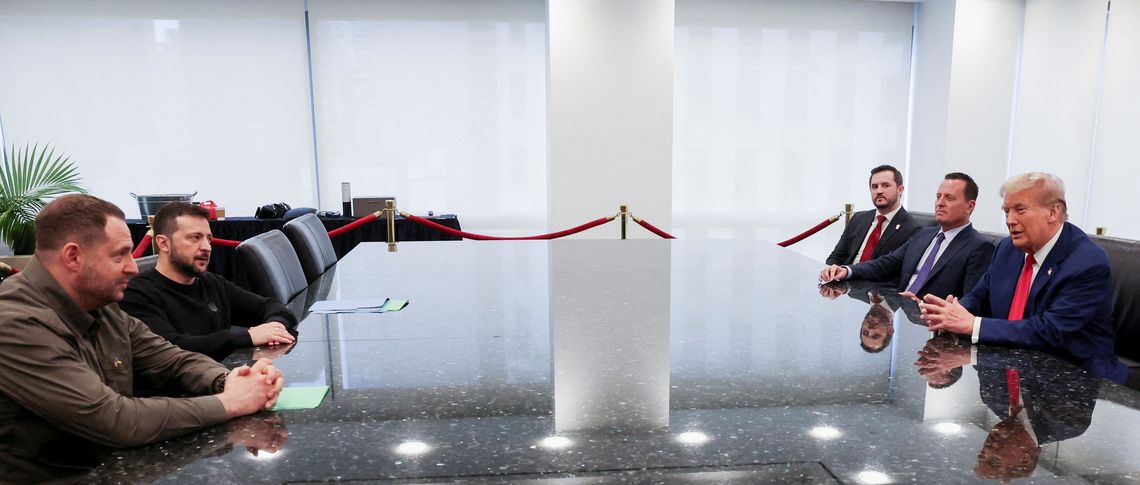In the last few weeks, following the vocal and sometimes outrageous statements made by US President Donald Trump, the main focus of any discussion about Ukraine has gradually shifted from the protection of the country from Russia’s war of aggression to political infighting and demands for elections to be held amidst martial law.
Even if we ignore the point that the head of the White House does not have the authority to declare elections in other countries, it is important to understand that any electoral campaign consists of two interrelated components: ideological content and voting infrastructure.
As of the end of February 2025, it is difficult to know which of these election components would cause Ukraine the most problems. Politically, it would be extremely difficult, if not impossible, for Ukraine to move from a long-standing ‘hot war’ to party competition. And for the state machinery to attempt to switch from working for the war effort to organising an election process may be even more of a challenge.
Trump’s rude comments about Zelenskyy having a four per cent approval rating are complete nonsense.
The ideological framework of future elections depends primarily on how the war comes to end and what the outcome is. But no one, neither in Ukraine nor abroad, can predict what the outcome will be.
Up until recently, the Ukrainian authorities were still looking for new mechanisms of cooperation with the Trump administration. The first conversation with Emmanuel Macron, Volodymyr Zelenskyy and Trump at the reopening of Notre-Dame in Paris offered hope that the US president would be willing to listen to the Ukrainian and European positions.
But immediately after Trump’s inauguration, he began to put his version of ‘ending the war in 24 hours’ into motion. This involved restoring relations with Russia and Vladimir Putin, forcing Ukraine to accept Russian demands, calling for elections and signing a controversial US-Ukraine mineral deal. Accordingly, chaos and uncertainty have reigned in the headquarters of the Ukrainian political parties, because even Zelenskyy’s former enemies do not know how to compete with him in such conditions of geopolitical turbulence.
Ratings, rivals, voter register
At the beginning of February, several important sociological trends could be observed.
The first is a steady decline in Zelenskyy’s presidential rating, though his personal credibility remains high. Of course, Trump’s rude comments about Zelenskyy having a four per cent approval rating are complete nonsense — Zelenskyy’s support is in the range of 50–60 per cent and his presidential rating is at about 20 per cent.
The second trend is the emergence of a major rival to the incumbent president in the form of Valerii Zaluzhnyi — former commander-in-chief of the armed forces of Ukraine and now Ukraine’s ambassador in London. After retiring in February 2024, Zaluzhnyi topped the polls and his scores still remain unattainably high.
It is worth pointing out here that the voters’ demand for a military leader could be met by someone other than Zaluzhnyi. Other military personnel are also in with chance to compete for second place in the polls. Among the leaders being mentioned are the head of military intelligence Kyrylo Budanov and the commander of one of the most effective brigades in the Ukrainian Armed Forces the 3rd Assault Brigade — Andriy Biletsky. It cannot be excluded that other renowned military figures may suddenly emerge.
The presidential battle will probably take place between Zelenskyy and a ‘newcomer’, most likely with a military background. Zelenskyy’s political strategists are nervous about open confrontation with new candidates. From their perspective, it would be better to have someone from the ‘old guard’ pushed into the second round. A media power struggle, the opening of criminal cases and the imposition of sanctions on former president Petro Poroshenko are the scenarios some analysts associate with this outcome.
At the beginning of Russia’s full-scale invasion, Ukraine’s Central Electoral Commission closed access to the voter register.
But the US president’s overt attacks on Zelenskyy and his ruthless pressure when it comes holding elections could completely transform all political configurations which seemed self-evident just a few days ago.
Even more unpredictable is the situation regarding the voting infrastructure. It is not even known which Ukrainians will be able to vote and where.
At the beginning of Russia’s full-scale invasion, Ukraine’s Central Electoral Commission closed access to the voter register. In three years of war, tens of thousands have died, millions have left the country and become internally displaced. For elections to be held, this register would have to be updated. And collecting new data requires a lot of time and resources.
Only one in 16 Ukrainians abroad is registered with the consulate. The government essentially has no access to the other 15. But without this, it is impossible to ensure they have vote.
Moreover, it is difficult for parties and candidates to campaign among emigrants because the majority of EU countries either restrict or ban foreign political parties entirely. And it is even more of a challenge to access the million mobilised military personnel who are explicitly prohibited by law from participating in political life.
Yet another question which remains open is where to vote. Polling stations are supposed to be secure spaces which ensure a secret ballot and a safe voting process, as well as a fair and transparent vote count and storage of records. In the frontline areas, which cover a third of the country, Russian shells, drones and missiles destroyed the places that once hosted polling stations: schools, kindergartens, hospitals, factories, etc. No one will be able build new premises in such a short space of time.
How to proceed?
Obviously, in this context of such an extensive transformation of population structure, new forms of voting will have to be sought. In particular, scenarios of remote or early voting could be considered, but at present there are no provisions for such options in the Constitution of Ukraine and the Electoral Code.
Extending the voting period, for example, by a week would attract more people and partially mitigate security risks such as air-raids. But this option significantly increases the cost of organizing elections to be borne by Ukraine.
And what about organizing voting for the millions of Ukrainians abroad? Ukraine has about 120 embassies and consulates, most of them outside Europe. It would be physically impossible to pass millions of voters through these embassies in one day.
The question of elections in post-war Ukraine will arise sooner or later, and it will have to be resolved — but it will not be a quick fix.
Of course, one can refer to the conclusions of the European Court of Human Rights and the ‘Venice Commission’ which state that a country may but is not obliged to allow its expats to vote abroad. But would this be right and fair in a situation where virtually every fifth voter has had to flee the country? In all previous elections, Ukraine has guaranteed its citizens an opportunity to vote abroad.
Now there are several ways to overcome this situation. The first is to increase the number of polling stations with paper ballots. This is the easiest option, because you do not have to change the laws. But to open new polling stations, you need a lot of extra money, logistics channels and trained staff.
Another way would be an early postal vote. This option is cheaper, but has a number of disadvantages and risks. To introduce this form of voting requires a change in the legislation and the provision of a long run-up period before election day to send out the ballots. Trust in the postal service is also a weak spot, as doubts can delegitimise the voting process.
The most promising option in terms of speed and price is remote voting on the internet. But no country in the world has ever held such a large-scale online vote as Ukraine would have to. The software that would be needed for this simply does not exist. Moreover, the risks of online voting are significant. Here we are primarily talking about cyberthreats and possible violations of anonymity and the secrecy of the ballot.
So, the question of elections in post-war Ukraine will arise sooner or later, and it will have to be resolved — but one thing is for certain, it will not be a quick fix.






